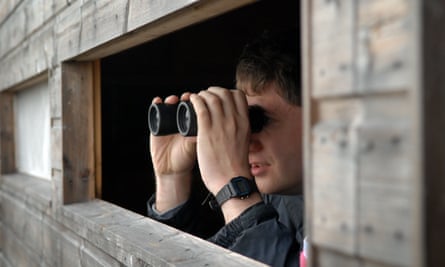A new study has supposedly pinpointed the most boring people alive: birdwatchers, accountants, data analysts and everyone who works in insurance. (What, no trainspotters? A major oversight.) The University of Essex research lists the most boring hobbies as going to church, watching TV and “animal observation”. All these things were judged to be worse even than stamp-collecting.
Of course, when you undertake this kind of research, you also have to find the opposite types. So the study lists actors, scientists, journalists (and in particular “science journalists”) as the “least boring” professions. The research, published in the Personality and Social Psychology Bulletin, was conducted by Wijnand van Tilburg, Eric Igou and Mehr Panjwani, all possessing refreshingly unboring names and presumably blessed with many science journalist friends.
They conducted five experiments involving more than 500 people. The more you dig into their findings, the more you realise how intensely annoying we humans all find each other.
Not content with dissing the entire insurance and data industries, the respondents had it in for smokers, “people who live in medium-sized towns” and “people who talk a lot and complain often”. They dreamed of being compensated financially for socialising with “boring” people (“£35 a day” is the imaginary going rate). And there also seems to be a thread of self-loathing running through the conclusions. “Watching TV”? Really? If that is boring then millions upon millions of us with a Netflix password are cursed with the blight of tedium.

Unpicking these Sartrean responses – “L’enfer, c’est les autres” [Hell is other people] – there is not only a widespread lack of self-awareness but also a heap of contradictions. Take journalists and actors. No one talks as much or complains more. And arguably these two professions also harbour a great many of the few smokers left in society. So how can they be both boring and “the least boring” at the same time? Is it that the activities themselves – perfecting a spreadsheet, creating a Facebook folder for your safari wildlife photography, listening to a sermon – are supposed to be boring? Or that the people who do them are dull? To be fair, I would rather be spared all amateur wildlife photography, especially if we are talking about the close-up of a fox in our garden which someone in my home was so excited about that he had it framed. (It’s really just a lot of blurry orange fuzz.)
Surely the key to all this is the second part of the study’s title, “Boring people: stereotype characteristics, interpersonal attributions and social reactions”. This is about our stereotypes of who and what is boring. These preconceptions bear as much relation to reality as the idea that you would ever get paid to put up with someone who makes you yawn. (Actually, this is very possibly the substance of many professional lives and/or marriages. But that’s a whole other study.)
I know a number of people, for example, who find spreadsheets deeply exciting and engrossing. They are well-suited to accountancy and they are welcome to it. As long as they don’t try to co-opt me into their information bacchanal, all is well with the world. Because it is not an activity or a profession in and of itself that is boring or that makes you boring. It is your insistence on forcing its significance on others who do not share your passion.

When we label others as boring, it’s either because we lack the imagination to understand what they get out of tracking the silvery-cheeked hornbill, or it’s because they chewed our ear off about something we’re just not interested in. This whole exercise is reminiscent of the old joke: “How can you tell if someone is a vegan? Don’t worry, they’ll let you know.” We are not necessarily intolerant of the habits and life choices of others, but they don’t half drive us out of our minds when they bang on about them. My big surprise is that wild swimmers did not crop up in this study. Surely they are the most mind-numbingly boring of all. And I speak as one of their number – although I promise to speak as little as possible.
I associate the word “boring” with my 1980s childhood thanks to the TV show Why Don’t You…?, whose full title was: “Why don’t you just switch off your TV set and go and do something less boring instead?” (Again with the TV-bashing and this from an actual TV programme.) As a small child I was repeatedly told: “There is no such thing as bored, only boring people.” The inference is clear: if you are bored, you have only yourself to blame.
As I’ve got older I’ve learned to embrace the opposite idea: that being bored and being boring are positive things. I am not interested in being fascinating to all people. If some people think I am boring, then hurrah. It will protect me from their attentions. And if I am bored, then that’s also good. It will give me a moment to sit with my thoughts and perhaps experience some kind of peace. The Covid time has been one long embrace of boredom for many, deprived of our usual distractions, relationships and comforts. Boredom can be a luxury and a blessing. It’s often better than the alternative: the vicissitudes of life.
How can any of us be certain of being less boring? The key is to avoid people who are so boring themselves that they can’t take the time to see beyond stereotypes. Instead, why not think of being boring as a badge of honour? There’s something deeply satisfying in being so unbearable to others that they would want to be paid £35 to put up with you. Boredom is in the eye – or indeed the binoculars – of the beholder.
